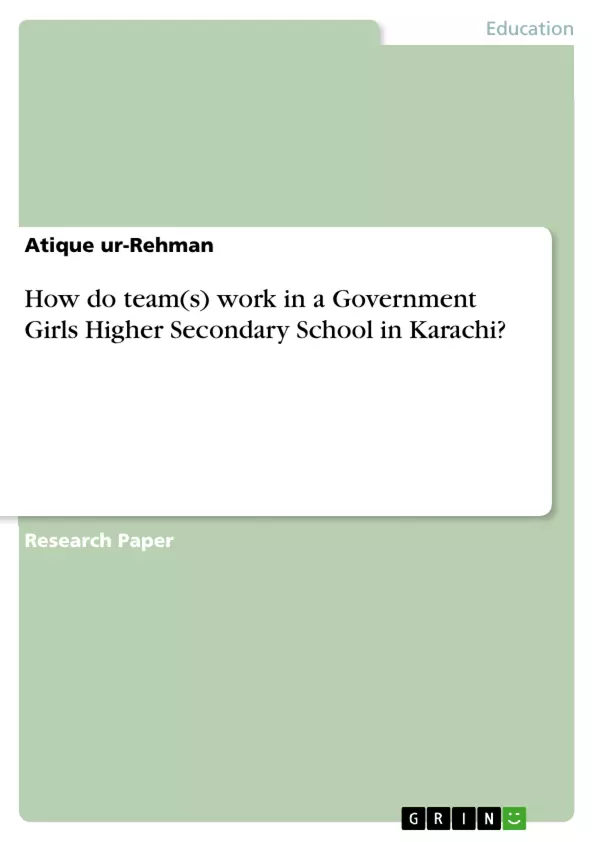This qualitative study investigates and develops an in-depth understanding of teamwork in a Government Girls Higher Secondary School Karachi. The study was conducted to gain a qualitative insight into teamwork process. Exploring how team(s) work in the school, and what consequences they lead to. This thesis argues that teamwork is an effective dimension which bridges the gaps between teachers and management. The study focuses on the Management Team, how it works, and how it influences other teams. The Management Team work described in four areas: origin of teamwork, the Management Teams activities, teachers and students’ perceptions about teamwork and the consequences of teamwork.
The study was contextual which required the qualitative case study paradigm. Interviews and observations were the main methods of data collection. It has analyzed the data using grounded theory development approach. The study was conducted in a Government Girls Higher Secondary School in Karachi. The primary research participants were three members of the Management Team (headmistress, two teachers), while secondary research participants were two teachers, and two students who were not involved in the Management Team.
The major findings of the study are: Teamwork leads to collectivism, develops a caring relationship, enhances commitment to school, and tends to lead to distributed leadership.
The study offers insights for school headteachers/headmistress, educational manager and teachers. It points out the importance of working together in improving school collaborative culture, building teams, and distributing task. The thesis also highlights teamwork effectiveness in terms of teachers’ involvement in the school management.
Inhaltsverzeichnis (Table of Contents)
- Abstract
- Introduction
- Literature Review
- Statement of the Problem
Zielsetzung und Themenschwerpunkte (Objectives and Key Themes)
This qualitative study aims to investigate and understand teamwork within a Pakistani government girls' school. It explores how teams function, their consequences, and the role of the management team in influencing other school teams.
- Teamwork dynamics in a government school setting.
- The impact of teamwork on school culture and effectiveness.
- The role of the management team in fostering collaboration.
- Teachers' and students' perceptions of teamwork.
- Consequences of effective teamwork within the school.
Zusammenfassung der Kapitel (Chapter Summaries)
The Abstract provides an overview of the study's methodology, findings (teamwork leads to collectivism, caring relationships, and distributed leadership), and implications for school leaders and teachers. The Introduction contrasts the often-cited individualistic approach in Pakistani government schools with the researcher's experiences observing collaborative environments, highlighting a need for further investigation. The Literature Review explores existing research on teamwork and its positive effects on schools, emphasizing the potential for improved decision-making, learning, and information sharing. The Statement of the Problem further emphasizes the contrast between the common perception of a lack of teamwork in government schools and the researcher's observations of successful teamwork in some schools, motivating the study.
Schlüsselwörter (Keywords)
Teamwork, Government schools, Pakistan, Qualitative research, School management, Collaboration, Distributed leadership, Educational reform, Teacher involvement, School effectiveness.
Frequently Asked Questions
How does teamwork function in Pakistani government schools?
While many schools follow an individualistic approach, effective teamwork in some schools bridges the gap between teachers and management, fostering a collaborative culture and distributed leadership.
What is "Distributed Leadership" in a school context?
Distributed leadership means that responsibilities and decision-making are shared among the headteacher and staff members, rather than being concentrated in a single person.
What are the benefits of teamwork for teachers?
Teamwork leads to higher commitment to the school, develops caring relationships among staff, and allows teachers to be more involved in school management and decision-making.
How do students perceive teamwork in their school?
The study explores student perceptions, indicating that a collaborative environment among teachers often translates into a more supportive and organized learning experience for students.
What was the methodology used in this school study?
This was a qualitative case study using interviews and observations, analyzed through a grounded theory development approach in a Karachi school.
- Quote paper
- Atique ur-Rehman (Author), 2008, How do team(s) work in a Government Girls Higher Secondary School in Karachi?, Munich, GRIN Verlag, https://www.grin.com/document/183050



